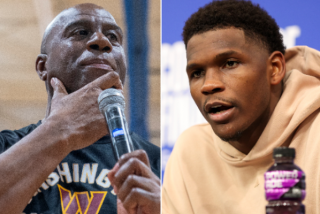It’s Mailman’s Biggest Delivery
- Share via
Karl Malone is a very formidable basketball player. He has size and strength--he is 6 feet 9 and 260 pounds--and speed. He is a 30-point-a-night scorer.
But he might have done something off the floor this week that neither he nor any other forward in the league could ever do on it--stop Magic Johnson in his tracks. Take him right out of his game.
The story was in a corner of the New York Times sports sheet Sunday, not flamboyantly featured but right alongside the automotive column. It was easy to miss. But, as I read it, I realized that sportswriter Harvey Araton was bringing a ball up-court that was going to break the game wide open.
The headline was innocent enough: “Johnson, the N.B.A. And the Fear of AIDS.”
But the story went right to the hoop, and began by quoting Malone, of the Utah Jazz, in compelling terms. Malone, the story said, was “challenging the accepted belief that Magic Johnson has been universally welcomed back to the (NBA) even though he has the virus that causes AIDS.”
“Look at this,” Malone was quoted. “Scabs and cuts all over me. I get these every night, every game. They can’t tell you that you’re not at risk, (against a player with HIV) and you can’t tell me there’s one guy in the NBA who hasn’t thought about it.”
Now, this was not coming from some bigoted redneck, this was coming from the league’s Mailman, a superstar in his own right, a man who had been a teammate, no less, of Magic on the Dream Team, which went to Barcelona for the Olympics last summer and won the gold medal.
Those quotes had to hurt Magic.
They had to play a part--maybe a big one--in Magic’s abrupt decision to abort his comeback this week, to re-retire, hang up No. 32, once and for all.
His explanation was cloaked enough, but it contained the telltale phrase, “It has become obvious to me that the various controversies surrounding my return are taking away both frombasketball as a sport and the larger issue of living with HIV. . . . “
English translation: Magic feels his continued insistence on playing will do more harm than good for the fight against HIV and AIDS. Score a three-pointer for Karl Malone.
Araton’s story also quotes Gerald Wilkins, a guard with the Cleveland Cavaliers, as saying: “Everybody’s talking about it. Some people are scared. This could be dangerous to us all but you’re dealing with Magic Johnson, so people are handling it with white gloves. They’re not going to say how they really feel.”
Several unnamed players and general managers were quoted as joining the anvil chorus.
The story additionally noted that, since Magic’s announcement that he has HIV, players who get cut must now leave the floor immediately to get treatment to stop the bleeding. These precautions can hardly be reassuring to the playing personnel.
Magic on court has always inspired fear on the part of the foe, like Geronimo on horseback or Rommel in a tank--but Magic wants to inspire that kind of fear, not the fear of infection.
When I wrote a column some time ago, suggesting the possibility of Magic’s return, I received letters from doctors who held that a return to the stressful life of pro basketball was the worst possible treatment for his disease. Other doctors were not so sure.
Magic seemed to gravitate toward stress anyway. Shooting a three-pointer at the buzzer can be stressful--but so can criticizing the President of the United States. Magic was never one to go off to a mountain cabin and commune with nature and eat fruits and nuts and await his fate. Magic was a people person. Playing basketball might have been the least stressful thing he did.
The guess here is that the statements of ex-teammates, rivals and fellow players have done what the doctors, lawyers, his own manager and even Arsenio Hall could not do--persuade Magic to turn to the rocking chair.
Magic does not want to be anybody’s Typhoid Mary.
How real are the fears? Very real to the players involved. Almost nonexistent scientifically. The possibility of transmittal is said to be in the zero to infinitesimal range.
That’s not enough for some athletes. An unnamed guard in the New York Times’ story talks of “backing off” rather than guarding Magic aggressively. Fear of collision may dictate timidity.
The only segment of the population that could decisively influence Magic has done so. As Phoenix owner Jerry Colangelo predicted, “The only people who might have impact on Magic are the players.”
Magic Johnson might have been the greatest player who ever lived. Certainly, he was the most unselfish. His 9,921 assists attest to that. His 17,239 points could have been infinitely higher--in the 30,000 range--if he had gone more for the basket than the open man.
A man who would go through a career thinking of others would not want to end it by causing pain or apprehension or fear or loathing in his fellow players. Magic would always give himself up for the team. Now, he’s giving himself up for the game.
The Mailman always rings twice. Magic got the message.
More to Read
Go beyond the scoreboard
Get the latest on L.A.'s teams in the daily Sports Report newsletter.
You may occasionally receive promotional content from the Los Angeles Times.










